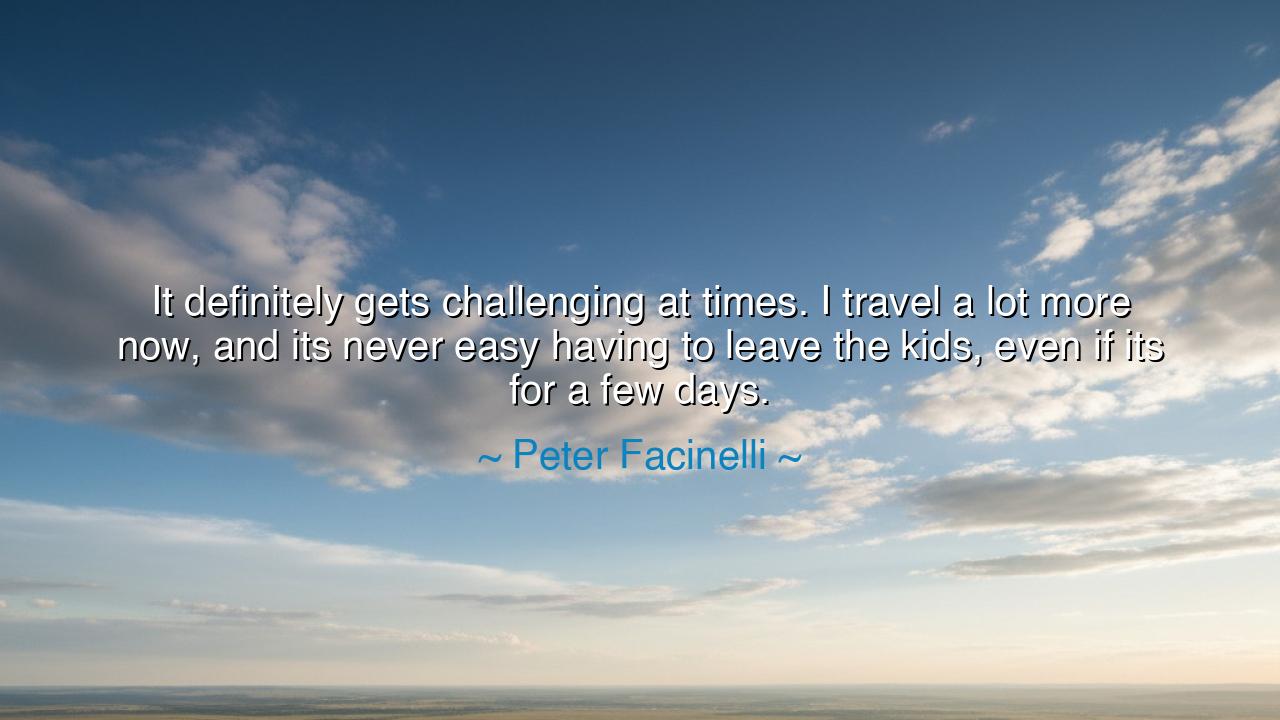
It definitely gets challenging at times. I travel a lot more
It definitely gets challenging at times. I travel a lot more now, and its never easy having to leave the kids, even if its for a few days.






Peter Facinelli speaks with the voice of a father torn between duty and devotion when he says: “It definitely gets challenging at times. I travel a lot more now, and it’s never easy having to leave the kids, even if it’s for a few days.” These words, though gentle, strike deep into the eternal struggle of humanity: the balance between work and family, between providing for loved ones and being present with them. In his confession lies the weight of love, sacrifice, and longing.
The first truth of his words lies in the acknowledgment of challenge. Great journeys are never free of burden, and the labor of parents is not only to provide but also to remain present in the hearts of their children. Travel, though it expands horizons and brings opportunity, often comes at the cost of separation. Facinelli names this plainly: each departure, however brief, is a wound of absence. It is a reminder that even success carries its shadow.
He speaks of the sorrow of having to leave the kids. This is not the grief of abandoning but the ache of temporary distance. To a child, a few days can feel like an eternity; to a parent, each absence is filled with questions—will I miss a laugh, a milestone, a fleeting moment of tenderness that can never be repeated? His words echo the cry of countless parents across time who, though driven by duty, carried within them the ache of longing for home.
History offers us many mirrors to this truth. Consider Odysseus, who wandered far from Ithaca for twenty years, longing to return to Penelope and Telemachus. Though his journey was filled with adventures, his heart was always tethered to the hearth he had left behind. Or think of the medieval knights, who rode to distant wars or crusades, leaving behind families who waited in silence and uncertainty. In each case, the struggle was the same: the clash between public duty and private love.
Yet in this struggle lies nobility. To travel for work, to endure separation, is not only sacrifice but also an act of love. The parent who leaves does so to provide, to build, to create opportunities for those at home. In this paradox, absence itself becomes a form of presence: the miles traveled and the hours worked are silent testimonies of devotion. Facinelli’s words remind us that separation, though painful, is often born from love’s labor.
But his words also carry a gentle warning: do not let duty eclipse presence entirely. For children do not measure love by gifts or provision alone—they measure it by touch, by time, by presence. A life spent only traveling without returning is a life that may one day look back and wonder what was lost. Balance, therefore, becomes the highest wisdom: to give both bread and presence, both opportunity and affection.
The lesson is clear: treasure the time you have, for it is fleeting. If you must leave, leave with love, and return with purpose. When you are home, be truly present—put aside the distractions of the world and give your heart fully to those who wait for you. And if you are one who receives a loved one back from journeys afar, welcome them with warmth, for they carry not only their own burdens but also the silent longing to be with you.
Practical counsel follows: seek balance in your life. If work takes you away, let it not take you completely. Send words, send love, remind those at home that they are with you even when absent. And if you are home, be mindful: do not waste the hours on shadows but spend them on what endures—your children, your family, your beloved ones. For Facinelli’s words remind us of a truth as old as time: duty may carry us away, but love must always call us back.






AAdministratorAdministrator
Welcome, honored guests. Please leave a comment, we will respond soon